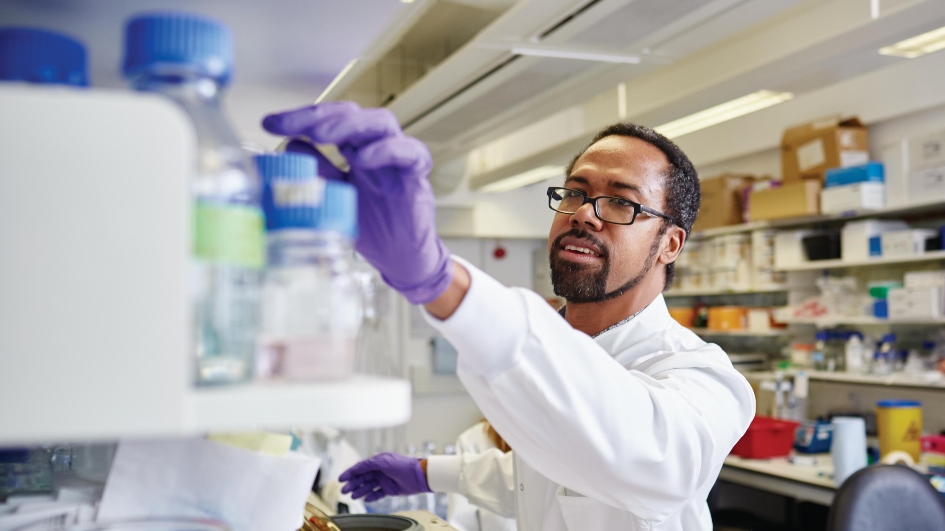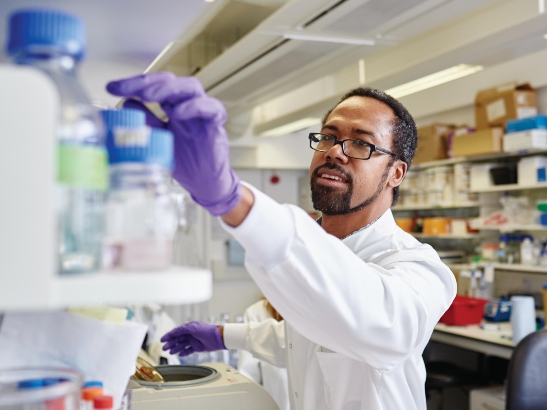
Image: Dr Michael Ranes is Co-Chair of the Race, Ethnicity and Cultural Heritage (REACH) Forum and a Higher Scientific Officer in the Structural Biology of Cell Signalling team.
Prostate cancer is the most common cancer in men in the UK and it is not understood why some men, including Black men, are at higher risk.
The PROFILE study, led by Professor Ros Eeles, Professor of Oncogenetics at the ICR, aims to address this gap in knowledge by looking at the genes of healthy men at higher risk, including men of African or Caribbean descent, to find out whether genetic information can better target who needs prostate cancer screening.
But Black men are an underserved group in medical research, and recruitment of Black men into the study has been slow. The team knew that they needed to do more to engage with Black men and ensure they had the opportunity to take part.
For guidance, researchers consulted members of the Race, Ethnicity and Cultural Heritage (REACH) Forum’s Men’s group. Together, they co-created a video to raise awareness of prostate cancer risk amongst their communities and promote participation in the study.
The involvement project was led by Dr Emma Hainsworth and funded by a patient and public involvement and engagement grant from the NIHR Biomedical Research Centre at The Royal Marsden and the ICR.
We spoke to Dr Michael Ranes who was involved in the project as a member of the REACH Forum men’s group. He is also Co-Chair of the REACH Forum and a Higher Scientific Officer in the Structural Biology of Cell Signalling team.
Why is it important to involve Black communities in this research?
The PROFILE study did not exclusively focus on Black men, but indeed prostate cancer is more common amongst those of African or Caribbean descent. Which is why we need to ensure that these communities are involved in studies from the outset so that this research can benefit those most affected.
When Dr Emma Hainsworth reached out to me and other members of the Race, Ethnicity and Cultural Heritage (REACH) Forum’s Men’s group, we were glad to see that the necessity of this involvement was recognised.
Many clinical trials have skewed to more homogenous white demographics and we have seen how this can have a negative impact on Black communities and other ethnic groups. Reflecting the diversity of our communities is crucial to developing more equitable cancer treatment and care.
What challenges have led to the under-representation of Black communities in research?
It’s complex and there are many systemic and longstanding issues ranging from lack of access to care to discrimination. The Covid pandemic has exposed many of these disparities and their devastating impact on racialized communities. There is a level of apprehension about participating in clinical trials and research as Black people have a long history of poor medical treatment. However, many of these issues are still alive today from the way systems are set up to everyday racism.
Certain diseases also have cultural stigmas, especially prostate cancer. I know from talking to my family in the Caribbean that some people still have an ill-informed idea of prostate cancer screenings, which can include genetic tests or rectal exams. We need to work with these communities to counter these misconceptions and build trust by showing the benefit of participating in research.
What were some of the key messages men in the group wanted to relay?
One key message was to not make it solely about the individual. Prostate cancer isn’t only about you, it affects your children, your family and your community and we wanted to tap into that bigger picture. It’s about shifting the idea from doing it for yourself to doing it for others. It’s also about gathering family members to encourage the men in their lives to get checked out and start those conversations.
What was the rationale behind filming the video in a barbershop?
African-Caribbean barbershops are well-known community hubs. The place I go to is always a lively atmosphere with people talking about all kinds of stuff – football, politics, and music.
During discussions with the men from the PROFILE study and from the REACH Forum, we wanted to recreate a familiar setting where there is a shared bond and in an environment where you can talk freely about these things.
The tendency with men is that we don’t open up, especially if you’re from certain cultural background. You’re more guarded with your feelings and it’s difficult to broach tough topics. That’s part of the reason why we started the REACH Men’s group to create a space for these conversations and why we felt the barbershop was the right setting for the video.
Why did you choose to get involved with this project?
The main reason was because eight years ago my dad was diagnosed with prostate cancer. Luckily, it was caught early through screening and he was able to undergo surgery. My father is alive today because of prostate cancer screening so I want to do everything that I can to help with research and to encourage others to get screened.
Why is diversity in cancer research important?
Diversity is essential to cancer research – it makes our science better. Diversity in science provides us with a wider range of insights and problem-solving approaches.
And it's not just about what you learned at university. There is a deeper level of understanding that comes from your culture, gender, background and experiences. It has an impact on who you are as a researcher and how you approach your research. What we want is to bring together the best people, but also the best people from a wide range of backgrounds that offer different skills and perspectives.
There has been a lack of diversity, with a massive underrepresentation of Black scientists in cancer research. We’ve seen some progress in recent years, but much more work needs to be done especially in reaching the higher levels of faculty and management, and placing diversity at the core of scientific excellence at the ICR and beyond.
We are hosting an online workshop on Thursday 21st October to provide information, advice and guidance on the ICR's PhD application process.
Can you tell us about your research?
I'm a biochemist by training and joined to the ICR as a Postdoctoral Fellow Structural Biology of Cell Signalling in 2014 because I was also really interested in structural biology techniques as a new way to approach scientific questions.
One of those key questions was the Wnt/β-catenin signalling pathway, which is an important for cellular processes. This pathway is also highly mutated in cancer, 90% of colorectal cancers have mutations in it.
While the pathway has been well-studied, it is incredibly dynamic and difficult to disentangle. My most recent project focused on recreating a part of this process in a test tube to understand a mechanism that leads to cancer development. We now have a system to test how different components work.
This also means that there is the potential to examine how this complex responds to different pharmacological strategies which can help us to unlock better ways to treat cancer.
The PROFILE study is currently recruiting men aged 40-69 years who are at greater risk of prostate cancer, including men of African or African-Caribbean ancestry, men with genetic mutations known to increase their risk and men of European ancestry with a positive family history of prostate cancer. The PROFILE study is looking for more Black men to participate in the study to help us improve the diagnosis and treatment of prostate cancer for black men in the future.
For more information, please visit the PROFILE study page. You can contact the PROFILE Study Team by phone at 0208 722 4483 or by email at [email protected].
